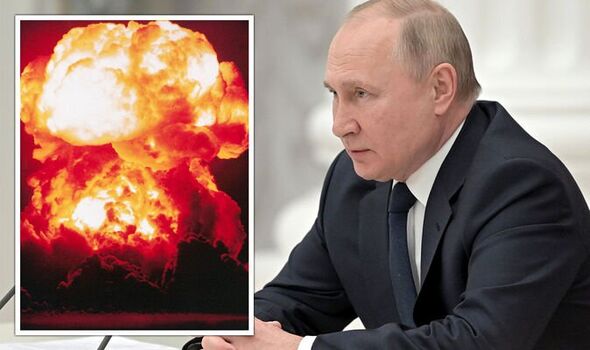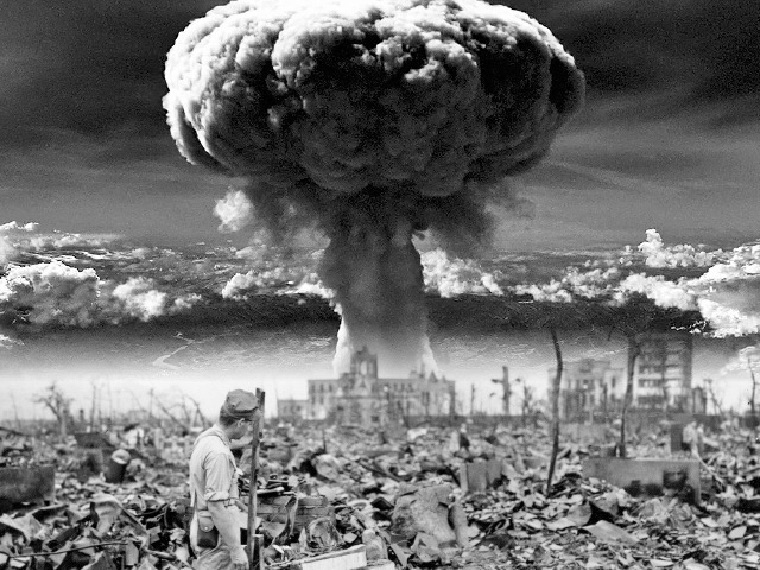
By definition all armed conflicts, even strictly local ones, are dangerous to the people so unfortunate as to be caught in them. That said, there is no denying that some such conflicts are much more dangerous than others. Generally speaking, three factors are likely to make them so. The first is their strategic significance, as when hostilities threaten to cut off important international sources of food, energy, raw materials, transportation arteries, and so on. The second factor is foreign intervention. The third is the absence or presence in the belligerents’ hands of nuclear weapons.
*
The present Russo-Ukrainian War contains elements of all three factors. Ukraine is a large country with a far from negligible population of (before the war) about 40 million. It has long exported both oil (primarily vegetable oil of which it is the world’s largest supplier) and, which is even more important, wheat. As the price of this vital food goes up many “developing” countries will suffer shortages which in turn will bring on all the social and political consequences such shortages normally entail.
As Putin himself has repeatedly and correctly said, strategically speaking the importance of Ukraine can hardly be exaggerated. Controlling Ukraine, Russia should be able to dominate the Black Sea and prevent anyone from opening another front from that direction. Not controlling Ukraine, it will find doing so much harder if not impossible. During the Cold War the distance from the East/West border to Moscow was about 2,000 kilometers as the crow flies. Should NATO grant Zelensky’s demand and allow Ukraine to join NATO, then it will be down to about 1,000 kilometers. Briefly, Russia with Ukraine is an empire. Russia without Ukraine is a mere state among others, albeit still a huge and, thanks primarily to its nuclear arsenal, a very powerful one.
*
Next, foreign intervention. As anyone with a map can see, Russia is entirely lacking in natural borders. Granted, much of the southern part of the country (though not the Ukraine, of course) is mountainous and hard to cross. Not so the northern half which is as flat as, if nor flatter than, any other on earth.
Nor is it merely a question of geography. As Stalin once said, the country has always been backward. It was this backwardness that enabled first Mongols, then Ottomans, then Poles and Lithuanians, then Swedes, then French, then Anglo-French (in the Crimea, (1853-56), then Japanese (1904-5 and 1939), then Germans (in 1914-18 and 1941-45) to establish or try to establish their rule over huge parts of it. All this without even mentioning the Civil War of 1918-21, a low point in the country’s history which saw everybody treating it as carrion and sending in forces; including, in addition to most of the above, Americans, Estonians (who almost captured St. Petersburg), Romanians, Italians, and even Greeks. This is not a situation many Russians are eager to repeat.
Today, too, foreign intervention is one of the main reasons, perhaps even the reason, why the war is as dangerous as it is. Throughout the years of Ukrainian independence, from 1991 to 2022, both the West and Russia have been trying hard to draw the new country into their orbit. Doing so, between them they have used means fair and foul: including propaganda, economic ties, political legerdemain, military assistance, and at least one attempted coup and at least one poisoning to achieve their goal.
A war between Russia and Ukraine is one thing. A war between Russia and NATO, quite a different one. Currently Western weapons, provided by the West and operated by Western-trained crews, are being used against Russia, much to the latter’s chagrin. One by one, on both sides of the conflict, we can see the elements that could make for a third world war being put in place. The miracle is that it has not yet broken out.
*
Next, nuclear weapons. Starting in 1949, the year when the Soviet Union caught up with the United States and tested its own atomic bomb, nuclear weapons have affected war here on earth in two contradictory ways. First, the so-called balance of terror has undoubtedly prevented many international crises from escalating; not just those affecting the US and the USSR but also such as involved lesser powers such as India and Pakistan. Looking forward from 1945, who would have predicted that eighty years would pass without a third world war breaking out? To judge by best-sellers such as Aldous Huxley’s Ape and Essence (1948), Nevil Shute’s On the Beach (1957), and Walter Miller’s A Canticle to Leibowitz (1959), as well as the immense success of movies such as Stanley Kubrick’s Doctor Strangelove (1964), almost no one.
Second, they have made the relevant international crises much more dangerous. Make the wrong move and, to revive a vintage Cold War phrase, poof goes “civilization as we know it.” Not as a matter of weeks, months or years, but within, say, a few hours of the button being pressed. For those who put their hope in anti-missile defenses, keep your hair on. Provided only such an attack is made with the right delivery vehicles and on a sufficient scale, no defenses existing today are capable of saving the country at which it is aimed.
*
As the above considerations show, the Russo-Ukrainian War is dangerous enough. Two scenarios can make it much more dangerous still. One is that Russia will win, presumably meaning that its armed forces will crush those of Ukraine, occupy Kiev and other key cities, do away with Zelensky and his government, put another, Russian or pro-Russian, one in its place, and annex parts of the country to Russia. Tired of the war and concerned about a possible Chinese invasion of Taiwan, the US resigns itself to the outcome and ends its support for a government that no longer exists. Assuming the Russians, having paid a heavy price, know where to stop and do not exploit their victory in order to invade additional countries in Eastern Europe, e.g the Baltic ones, or Poland, or Moldavia, that is the optimistic scenario.
The pessimistic scenario is much worse. Under this scenario the Russian army either suffers a crushing defeat—a possibility which, given the gigantic size of the theater of war, appears unlikely—or starts disintegrating through incompetence, corruption, and the sheer reluctance of its troops to fight. The revolt of the Wagner Group, quickly suppressed as it was, may at any rate indicate that such a collapse is possible. The war comes to an end—either because Putin starts putting forward peace-proposals that Ukraine and NATO can accept or because his subordinates mount some kind of coup, remove him, and come up with similar proposals.
Either way, the danger is great that defeat will cause Russia to disintegrate. As the term Federation implies, Russia is anything but a unified country. Sources differ; however, the best estimate is that, out of a population of 144 million, just 103 million are Russian. Depending on one’s definition, the remaining 41 million comprise anything between 120 and 170 nationalities and ethnic groups. As events in Chechnya e.g during the 1990s showed only too clearly, some of these are only waiting for an opportunity to throw off Moscow’s yoke. Faced with such a scenario, whoever rules in the Kremlin, cornered and unwilling to watch his country disintegrate, will be tempted to turn to nuclear weapons—first by way of a warning, then perhaps against real targets—as his last resort.
*
To recapitulate, there are several ways to make a dangerous war more dangerous still. Arranged in order of increasing danger, the list starts with the disruption of communications and economic life and proceeds through escalation as additional countries join the fray. The most dangerous possibility of all is a total Russian defeat leading to the use, by Putin or whoever may replace him in the Kremlin, of nuclear weapons.
In which case, God help us all.

